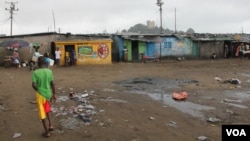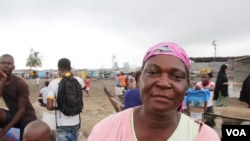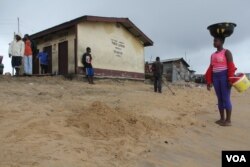In West Point, one the Liberian capital Monrovia's poorest neighborhoods, the situation is calm a month after the government forced quarantine on its inhabitants. But residents complain that businesses, social life and entertainment have suffered and other Monrovians treat them like outcasts.
On a cloudy day in the coastal city, fishermen can be seen offshore. Fishing is one of the city's main livelihoods.
West Point made global news last month, when the government forced a quarantine on the entire community, following a high number of diagnosed Ebola cases. The community rebelled with violent protests.
Marta Cowla, who sits on a canoe near the water, says things have been quiet since the quarantine was lifted, but life has become much harder.
"When we take to market and carry up, people do not want to buy because they say you all have Ebola here," she explains. "Business is not the way it used to be. So we end up carrying our business back.“
Not only has business suffered, but also social life, according to West Point resident Robert Sayon, 27, who is unemployed.
“When you have coffee. And even if you go to an entertainment spot, you cannot share glass with your brother or your sister because we do not know who is carrying the virus," he notes. "We do not know who is carrying the virus. So everybody has fear. We live in fear.“
US Initiatives to Fight Ebola
U.S. Initiatives to Fight Ebola
- Assign 3,000 U.S. forces to Monrovia, Liberia, to provide command and control support in the region, facilitate coordination of U.S. and international relief efforts.
- Train as many as 500 health care workers a week.
- Build 17 heath care facilities in the region of 100 beds each.
- Provide home health care kits to 400,000 households, including 50,000 that the U.S. Agency for International Development will deliver to Liberia this week.
- Carry out a home- and community-based campaign to train local populations on how to handle exposed patients.
Sources: White House, AP
Sayon admits he is angry with the government. Since the end of July, about 50 people have died in West Point. He says it often took up to five days until a burial team came to remove the corpse.
“Every day we die here. And the government does not care," he complains. "They do not, they do not care about us. They only care about us when there is an election. They come to us, they want us to vote them and we vote for them now. Look our living conditions.“
Liberia, one of the world’s poorest countries, does not have the resources to deal with the worst outbreak of Ebola in history.
The United Nations declared the West Africa outbreak a threat to international security and is mobilizing global assistance. The United States may spend up to $1 billion to fight Ebola and is sending 3,000 soldiers in to help with the logistics of testing and setting up treatment centers.
In West Point's crowded conglomeration of narrow houses and dirty alleyways, children play on the muddy ground. People complain there is only one public toilet.
Liberian Information Minister Lewis Brown understands the fear and the anger.
“The spread continues to outpace the rate at which we are capable to provide the kinds of support we would like to provide," Brown explained. "We are stretched very thin as a government. So we understand some of these criticisms from our people, but it is simply that we need assistance, we need it desperately, we need it now. Because as this virus continues to attack lives, what is under increasing attack is the livelihood of people, the way people have lived. Businesses have been shut down. So, the economy is grinding to a halt.”
The government says the Ebola outbreak took it by surprise and blames traditional practices and low level education for accelerating the spread of the disease.
But Monrovia residents have a different opinion. They say no one wants to go to a crowded, unhygienic Ebola treatment center where the risk of infection is even higher - if they can even find a center.
Meanwhile, the Ebola outbreak is expected to continue to grow before being brought under control.











